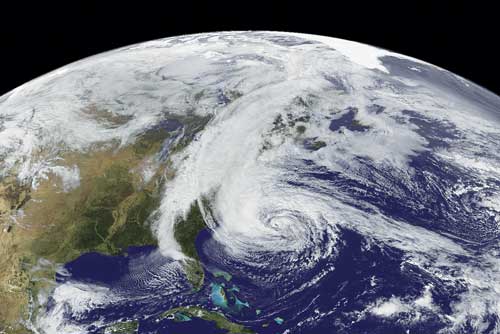Five Marine Affairs Alumnae Aid Hurricane Sandy Recovery

Tiffany Smythe, M.M.A. ’07, Ph.D. ’11, is a post-doctoral fellow with the U.S. Coast Guard Academy Center for Maritime Policy and Strategy. She conducts academic research in collaboration with the Coast Guard Sector of the Ports of New York and New Jersey, identifying lessons learned from Sandy that can inform planning for future storm events. One of her marine affairs classmates, Michelle Burnett ’00, M.M.A. ’07, is the state floodplain coordinator with the Rhode Island Emergency Management Agency. She’s been offering technical expertise, guidance, and support to coastal communities to ensure regulations are followed during the rebuilding and restoration of floodplains and floodplain structures damaged in the storm.
Carissa Lord, M.M.A. ’05, modified her schedule as the bi-state stormwater coordinator for the Blackstone and Ten Mile River Watersheds in Massachusetts and Rhode Island in order to take on a temporary position with FEMA to assist with Hurricane Sandy recovery efforts. As part of the mitigation team, she was involved in mapping everything from erosion rates to piping plover habitats and various structures in the flood zone. She worked alongside Hillary Slocum ’11, who knew she wanted to work in natural disaster mitigation even as an undergraduate in the College of the Environment and Life Sciences (CELS), where her coursework focused on government policy. In reviewing Local Hazard Mitigation Plans for compliance with FEMA requirements, Hillary has helped make cities and towns more resilient against future disasters and eligible for FEMA recovery payouts after such events.
Rebecca Eith ’10, M.M.A. ’12, another CELS graduate, is a data integration and coastal/environmental policy specialist in FEMA’s Hazard Mitigation branch. She’s been working 60-hour weeks since Hurricane Sandy, providing guidance on federal, state, and local policies to the architect and engineering specialists working on proposed recovery projects in New York. Her contributions typically include scientific processes, policy protocol, socioeconomic impacts, and regulatory restrictions on a project—all skills she acquired in URI’s Marine Affairs programs.
 Home
Home Browse
Browse Close
Close Events
Events Maps
Maps Email
Email Brightspace
Brightspace eCampus
eCampus


